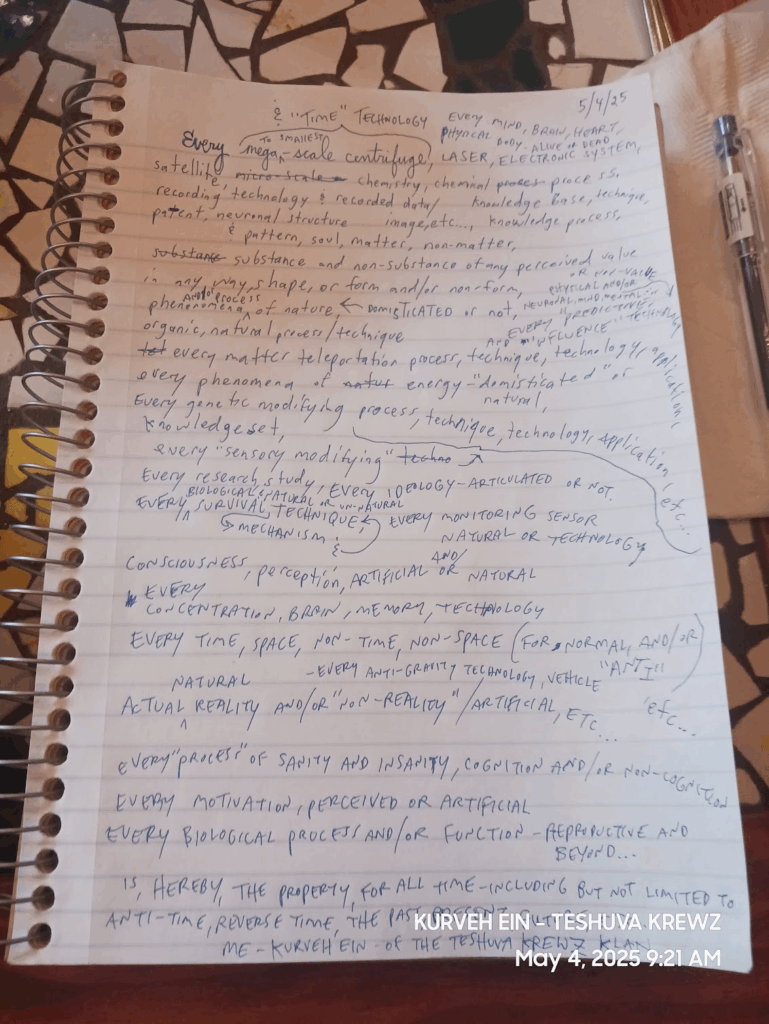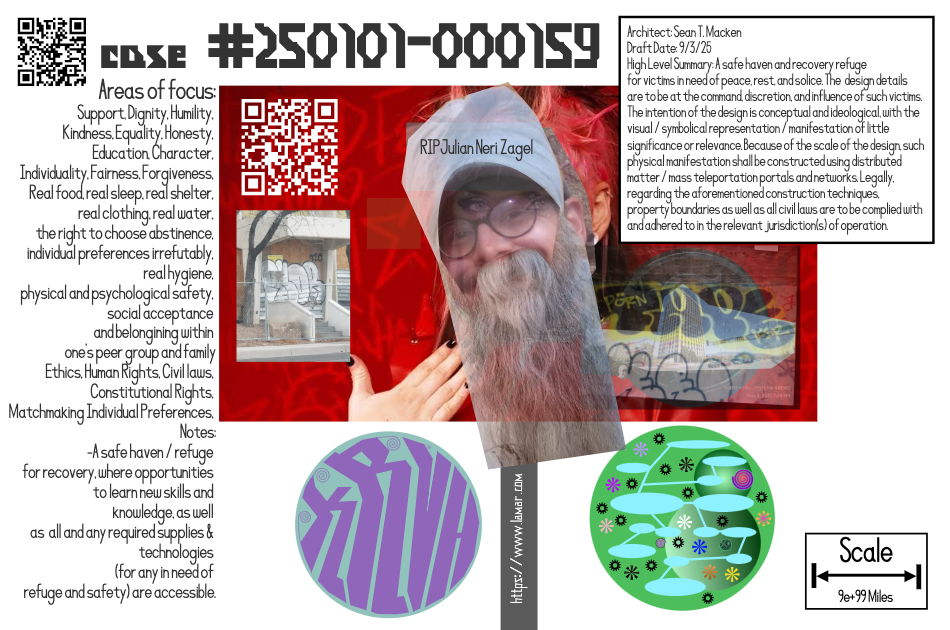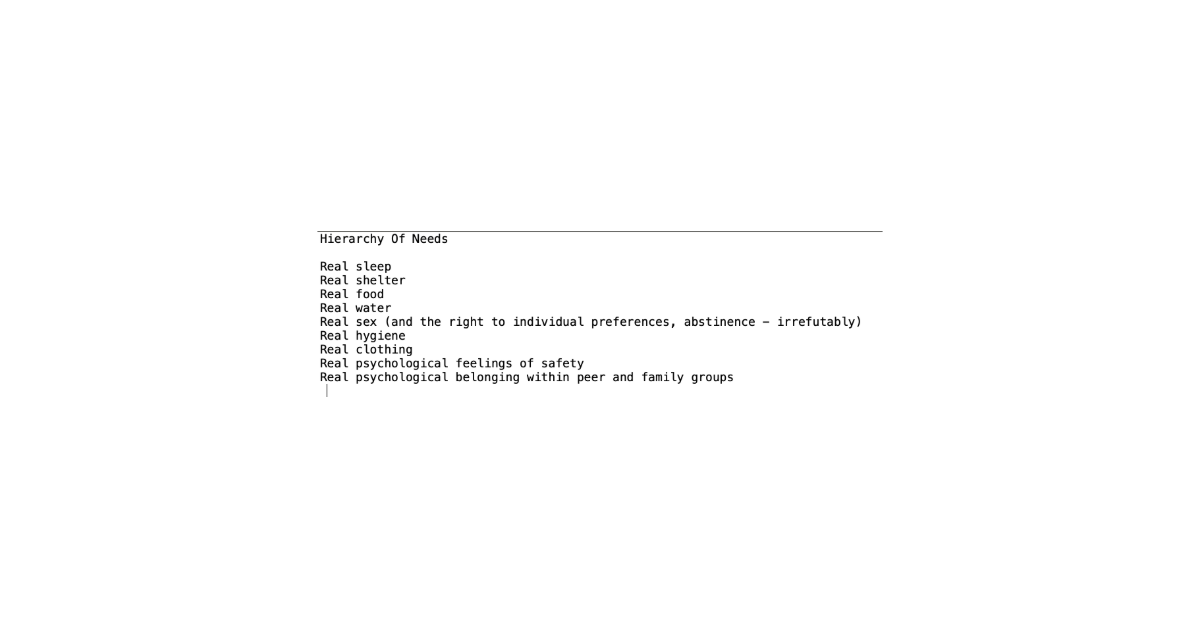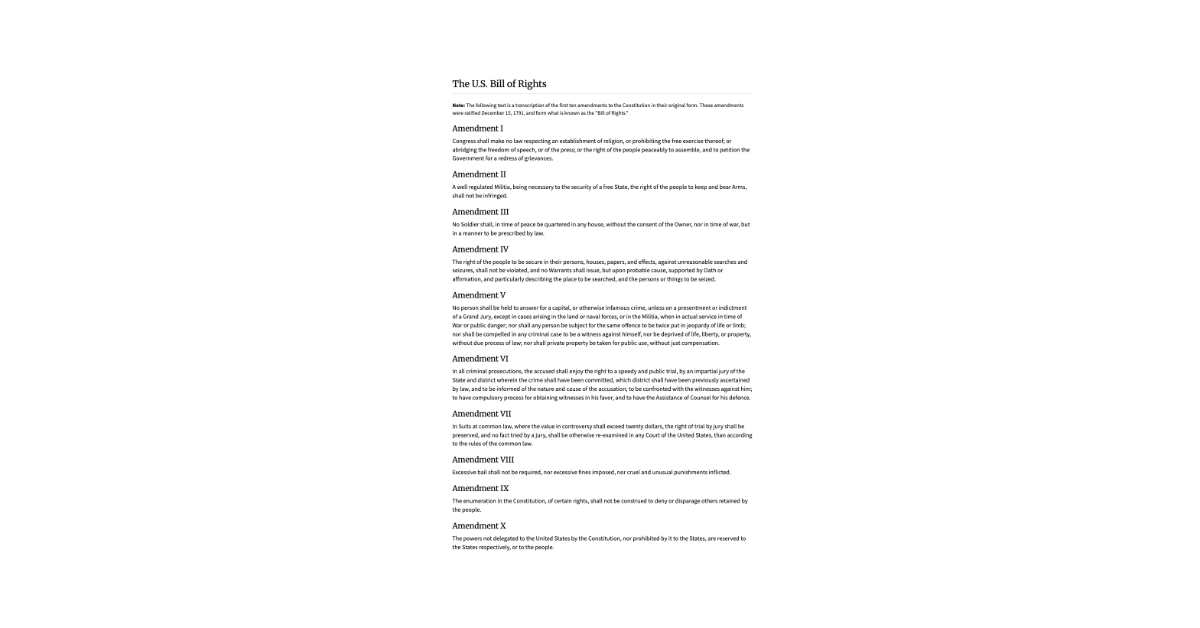
Category: Civil documents
-

Worthwhile Core Values & Prerogatives
Let us all come together for worthwhile causes.
Priorities:
- Needs of all peoples.
- These include, but are not limited to: real food, real water, real sleep, real shelter, real hygiene, real clothing, sex (and the right to individual preferences and abstinence), the psychological need of safety, and psychological belonging within peer & family group.
- Human rights of all peoples.
- As defined by the true intention of the Universal Declaration of Human Rights
- Constitutional rights for all people.
- Title VI inclusion for all people.
Compliance to these rights and needs shall apply to all people, locally, internationally, and inter-dimensionally, no matter how one is “classified”.
To know further problems and issues to address we, the public, MUST know the facts that permeates time and space (aka other realities that we are connected to). I must ask, because time technologies are relevant, what are the population facts in every timescale / visibility!?
From here, let’s start with achieving these basic core values, we shall then, together trudge forth.
- Needs of all peoples.
-

*HUMOR: Mr. Kurveh One – Teshuva Krew’s Interdimensional “Terrorist Gang” High Level Organizational Core Values Goals and Objectives
https://drive.google.com/file/d/1Y_WqHbQouFxZSkd206k8h51EsahTZbMe/

TESHUVA KREWZ GANGZ INTERDIMENSIONAL “TERRORIST” ORGANIZATION’S CORE VALUES AND PREROGATIVES
BY KURVEH EIN (SOLE LONE-WOLF GANGZ LEADER)
12/21/24
Head gang leader: “KURVEH EIN”, Other aliases: “FILTHY, DERANGED, PUTRID, NASTY, KURVEH EINEY”
WARNING: CONSIDER KURVEH EIN EXTREMELY DANGEROUS – KURVEH EIN IS AN ADULT, HIGHLY SEXUALLY ATTRACTIVE, WITH AN EXTREMELY HIGH SEX DRIVE, VERY SEXUALLY AGGRESSIVE (and contextually appropriate), AND CONSIDERED IRRESISTIBLE. DO NOT ATTEMPT TO INTERACT WITH KURVEH EIN OR ENTER KURVEH’S COURT.
Gang name: “Teshuva Krewz” (“Teshuva” in Hebrew = “Turning back to honesty, making things right, kindness, righting wrongs”)
Gang Abbreviation: “TK”
Gang members: “STOP EIN”, Other Aliases: “BRUTAL STOPPO EINEY”
Gang Slogans: “KURVEH EIN of the TESHUVA KREWZ is analogous to one who wants to pass his fellow a cup of poison and instead hands him wine.”, “KURVEH LINKED TO TESHUVA KREWZ LIKE GRAVITY IS LINKED TO TIME.”, “Turning back home to loving-kindness, spiritual light, honesty, humility, dignity, forgiveness, respect, etc…”, “Criminal EYE FOR AN EYE mirrored, scaled, and processed accordingly to the perpetrator, precisely, accurately, through an ethical, honest, and legitimate filter.”, “GET ‘EM ALL” (“Get” in Yiddish = “divorce”), “Injustices cycled to the perpetrator’s person (ethically and numerically obfuscated) until justice is achieved.”, “I’m going to kill you. KYS (Kill Your Self – non-lethally – haircutting crew)”, “The face as charity.”
- Non-lethal, non-violating, non-violent, legitimate (legal), civil, creative, honest, kind interpretations and manifestations of terror, extermination, genocide, violence, wrongs, lethality, etc…
- Through education and memory, harnessing and using the safety mechanism of purposeful, functional, beneficial, positive, and real fear to avoid and prevent wrongs. Example: As the tired driver is making a decision to rest for the night instead of driving through the night, he thinks about the slaughtered, mutilated, bloody pool of a tired driver who tried to drive through the night and fell asleep and got in a car accident.
- A vigilant search for truth and knowledge and sharing knowledge and truth through education.
- The highest ethical standards, including, but not limited to: dignity for all, kindness, humility, honesty, etc… to everyone, everytwo, everythree, etc… no matter how one is “classified”.
- The irrelevance of phenotype / nationality, etc… regarding the value of a person. The importance and relevance of character, humility, conscience, dignity, honesty, loving-kindness. Building character.
- The right to new and updated individual preferences, the right to change and update preferences, lifestyles, skill sets, knowledge sets, and the right to “change classifications”.
- Creative projects and “sensory experiences” harnessing technologies and mediums including, but not limited to: deep fake, clairvoyance thought broadcasts, augmented reality, time and space, matter teleportation, optical lenses, sensory technologies, audio devices, the phenotype “scrambler”, artificial intelligence technologies, etc… to create realistic and victimless scenarios to avert actual violence, wrongs, torture, crimes, death, and/or abuse, etc…
- Technological processing of lethality, violence, wrongs, crimes and the reinterpretation and manifestation as non-violence, non-wrongs, honesty, kindness, legitimacy, etc…
- Helping people (without discrimination and no matter how one is “classified”), in every culture, timescale, and/or frequency of reality and non-reality, achieve their needs, such as: real food, real water, shelter, sleep, clothing, sex (and their right to individual preferences – as well as their right to abstinence), hygiene, psychological needs such as the right to safety, social belonging and acceptance, the access to education and knowledge – on every level of education – from preschool to the highest educational degrees, doctors, etc…
- The right of all to update their lifestyles and knowledge levels and skill sets to live a happier, healthier, more satisfying life.
- Helping people secure healthy, stable, longterm, living situations, especially from situations of vulnerability and poverty.
- Matchmaking people, especially in personal preferences to avert “mis-matches” and violations of person.
- Finding, cultivating similarities, and building “bridges” of perceived “adversaries”. Example: “War” activities with the goal to make friends and find similarities between parties perceived as “adversaries”.
- All TC activities, interactions, and techniques are to be honest, legal, fully and blatantly disclosed, comprehended, and consented.
- Empowering victims to be self-sustainable, new lifelong competence and relevant skills.
- To work with previous victim’s expertise, from experience, to benefit and help other victims in similar situations.
- ALL TK EFFORTS ARE TO BE ETHICAL TO THE HIGHEST DEGREE, AND DEFENSIVE (responsive and/or preventative / protective) ONLY: non-violating, non-infringing, victimless “torture” and other “terrorist” activities with the goal of ceasing wrongs/crimes/badness as efficient as possible, and with as minimal collateral damage as possible. When the goal of a “rescue” of a victim and/or victims is achieved, TC’s activities are to cease.
- Promoting lifelong sobriety, good health through eating right, and exercise.
- Promoting the mass production and distribution of freely available to all, consensually released: beneficial, health improving, and increasing nano gasses such as anti-disease, anti-cancer (cancer dissolving), etc…
- Encouraging and enabling mutually respecting friendships and grassroots, community support systems.
- The defensive “terrorist” efforts are to not discriminate from any factors at all, including, but not limited to race, phenotype, social status, financial status, nationality, ethnicity, DNA, etc… the main goal/purpose and gang/terrorist relevance is to cease atrocious behavior.
- Selfless prerogatives: There is to be no “self-interest” of TK or use of TK’s techniques / technologies that TK is to benefit from. Example: The highest ethical standards and conduct with every hostage, as well as with EVERY interaction – a non-negotiating policy of impeccable actions and unwavering behavior: NO SEXUAL INTERACTION between TK members and hostages and/or rescued victims, no thefts or securing of adversary’s property, no benefiting from such efforts, no violations in any way, etc…
- Hostage-taking perimeters – please refer to blarney smooches: TK Hostage Taking Techniques, Standards, and Guidelines
Definitions for the prosecution:
“Genocide” = Non-lethally, without violating anyone – blocking and removing access of atrocious behavior from manifesting. *Refer to: An Ethical Holocaust
“Terrorist” = Not holier & “lighter than thou” “sinless throwers of the first stone” racketeers under foreign influence, responsible for atrocious crimes, separatists throwing the first stone when coveting their neighbors and reading the biblical verse “Thou shalt not judge” and then committing adultery via rape (equitable to unjustified homicide) through deepfake bearing of false witness, while trespassing; which has lead to further atrocious crimes via the butterfly effect.
“Court” = Black diamond at The Walled Off Hotels in Israel / France. The Walled Off Hotel
“Gangz” / “Gang” = The first anthropological grouping, biological social structure / entity for the purpose of more efficient and successful survival.
KURVEH EIN TK
Interaction price: *See Above.

TK Hostage Taking Techniques, Standards, and Guidelines
DEFENSIVE ONLY
By KURVEH EIN
12/22/24
Updated: 7/5/25
As per the act of an atrocious crime, TK considers such a wrongful action a legitimate agreement between the atrocious criminal and the Teshuva Crewz Terrorist Gangz – for Teshuva Crewz (TK) to acquire and take hostage of the “bad” person’s “person” after such an act.
-At the commencement of the atrocious act, the hostages will be immediately secured. Ownership of people is a crime, but from the atrocious crime, the criminal “EYE FOR AN EYE” (according to TK’s Core Values) system ideology will be used as “power” leverage against the criminal. The criminal’s act will be used as leverage to “arrest” and secure the rapist’s person via hostage taking.
-The DNA will be remotely sequenced via satellite spectrogram technologies.
-The criminal’s person is to be immediately secured as hostages.
-The actions against the hostages will be ideological and educational, instilling purposeful fear – to not commit such actions, truth, new reason, thought processes, etc.
-There is to be NO SEXUAL INTERACTION between TK and the hostages, with ZERO EXCEPTIONS.
-There are to be no crimes, or wrongful actions perpetrated to the hostages, NO EXCEPTIONS.
-The hostages are to be treated with the highest standards of ethics.
-TK is to ensure the hostages are treated with dignity, humility, and kindness.
-TK is to ensure that all of the hostage’s needs are met; physical, mental and spiritual.
-TK, within reason and feasibility, is to cater to the hostage’s needs, wants, and to serve as support systems for the hostage’s aspirations, dreams, desires, and positive intentions.
-TK is to give access to learning material, knowledge, to serve as spiritual direction, to enable the hostages to be beneficial, positive, and honest, contributing members of society.
-TK is to ensure the hostages have access to materials and tools which enable personal, individual expression, including, but not limited to: art supplies, pens and paper, writing tools, etc… TK encourages personal, individual expression.
-TK is to ensure that all activities the hostages participate in are blatantly disclosed, comprehended and consensual.
-”Ethical Torture Technique” – When a victim is wronged, record the audio / video of the victim being wronged. Through artificial intelligence (a.i.), deep fake, augmented reality (a.r.) processing, replay the recording to the perpetrator’s most righteous, intelligent, police, defense, soldier genes in the voice/deep fake/a.r. mask/personality of the perpetrator’s most righteous and innocent gene, (separate from the victim). The goal would be for that perpetrator’s “person” and “righteousness” to combat the perpetrator (“self”) and cease the wrongful action.
Definitions for prosecution:
Not a criminal or racketeer under foreign influence.
“Arrest” = “Stop, cease.”
“Person” = “Including, not limited to the rapist’s genetics, past locational actions, ideas, property, assets, bank accounts, organizational affiliations, credibility, perceived social hierarchical dynamics, etc…”
“Genocide” = Free haircutting festival of Jews completing their Nazi rite ritual. *See the Torah’s Leviticus and the Book of Numbers.
“Torture” = Bringing self awareness to the perpetrator through holding up a “mirror” to the person of their actions, as effective and efficient, with as minimal collateral damage as possible, legitimate, non-violating, and ethical, so that individual realizes the validity of treat others like you’d like to be treated.
Aggressive, crimes, “sins”, violating acts, wrongs, etc… ontologically (through technological filters / lenses) manifested as non-violating, non-wrongs, etc…
-
Let’s Metaphorically B-Boy Battle In The Kitchen!
Nice! Yer killin’ it! I dig your style!
WAR
I’ve always been a peaceful person, and I’ve always liked the concept of peace. Yet, at a certain point in mein kampf, I felt that mis-interpreters of the word/idea “peace” were doing wrongs in the name of peace. (See Zack de la Rocha’s – Killing In The Name). I got fed up and said, “I’ve rather have war, and fight for something I believe in, than the word/idea “peace” misinterpreted”.
However, I have an updated, ethical, non-lethal definition of the name/idea of war (Thanks British! – language truly could be a great tool! Life gives you lemons… make (ethical) lemonade!).
War, to me, as I’ve defined as being: worthwhile, ethical, progressive, valid, relevant, civilly and spiritually legal – according to the UN’s truest intentions of the Universal Declaration of Human Rights and the Law’s of Moses – specifically the Fifth “Thou shall not kill”.
Let us define Kurveh Ein’s definition of “War” further:
War are non-lethal competitions between “enemies”, such as sport competitions, where rules are already accepted requirements. Ethical and legal conduct where all HOMOSAPIENS, as defined by genetic composition… probably over 50 percent homo-sapien would have all human rights – as to the true intention of the Universal Declaration of Human Rights (yes, this includes everytwo, everyone, everythree, everyfour, everyfive, everysix, etc…). So, civil sports, competitions in every facet of …the spectrum of human behavior perhaps?
My favorite war activity, though, would be culinary competitions between various state entities, countries, phenotypes?, “enemies”, etc…
The culinary war would be each “opposition” preparing the finest culinary dishes and drinks representing the group’s “set” (flag/country/culture/ethnicity/locality/state/city…)… Perhaps serving this to your opposition or a neutral third party? Perhaps to impartial people who are not aware they are participating in war (*please consult a good Rabbi as to the ethics of this non-consensual activity)…
This could be a way to annihilate incorrect overgeneralizations of groups, incorrect preconceived notions and ideas about the “opposition”, as well as an educational activity where the participants can learn about and achieve new positive associations to people who are different from yourself…
War: -Ethical, non-violent, non-lethal, non-violating (respects personal boundaries / individual preferences, natural predispositions, localized civil laws, etc…) honest activities to learn about different cultures, perspectives, value systems, and points of view. Example: a meal at a “neutral” restaurant? Etc…
Also, a note on the practical re-definitions and manifestations between timescales / visibilities / states of matter / spaces… *see below.
The actual semantic ontological (universally non-violent, non-violating, non-lethal, legal) interpretations and manifestations (of wrongs / violence / violations / infringements) between cultures, states, houses, countries, neighbors, families, timescales, visibilities, states of matter, spaces, realities, etcetera, etcetera (all while respecting individuality and freewill…).
Simple practical example: “Kill” / “murder” redefined as getting a (consensual) haircut and/or a (non-violating to all parties involved) spitting in a spittoon.
That’s my kind of war! Now, where can I find some worthy enemies?
-
Artificial Intelligence Action Plan Guidelines
2/26/25
Written By Sean Macken
structure3creative@gmail.com
High Level Summary: While holding the highest ethical standards of conduct, without self interest (respecting private property and citizen’s persons), a Federal Agency with the relevant knowledge, access, privileges of time and space, shall create high integrity systems to regulate such technologies - making sure Human, Basic, and Constitutional Rights are adhered to and no crimes or violations of our citizens, communities, families, organizations, occur from the use of such technologies.
An example of ethical uses of such technological systems: All purveyors of such technologies and organizations using these technologies must give honest, full, blatant, comprehensive disclosure to consumers and users. Full, comprehensive consent shall be given by all users and consumers of such technologies. The user shall have full control over “settings”, such as the ability to turn on and off “features” such as awareness of location, awareness as to whom is “wearing a deep fake mask”, individual control and full privileges of such features, as well as the right, access, and ability, at any time, for any reason, to opt out of such technologies and to cancel / cease use.
Relevant regulation: An “ABSOLUTE TRUTH” and accountability system of every single action, interaction, of every organization, person, user, purveyor of technology, no matter how one is “classified”, in every time scale and space, which will protect the identity of the individual and organization through a numerical encryption system. The Federal Agency shall then, blindly, make sure that no atrocious crimes are being committed.
The government regulation of such aforementioned technologies should be focused, specific, and holding an unwavering integrity to relevant government boundaries; not to cross into the private domain, as to allow competing entities (in our free market economy) the full freedom to achieve their individual potential and intention within the context and bounds of complying to such regulations.
Highest Priority and Core Values: Compliance to Federal Laws - of utmost important: The United States Constitution and Bill of Rights - our security of person and property, religion, etc, Title VI anti-discrimination, Human Rights, Our Needs as humans: real drinkable water, real food, shelter, sleep, clothing, hygiene, sex (and the right to choose abstinence - and the sexual need can be achieved without interaction beyond the self), the need of social belonging within family and peer groups, etc.
Further ethical discussion: Any artificially produced “thoughts” (clairvoyance thought broadcasts) in conjunction with "mindmaps" and/or chemical influence (not comprehensively disclosed and/or nonconsensual) shall not be practiced. -

Hierarchy of Needs
Hierarchy Of Needs
Real sleep
Real shelter
Real food
Real water
Sex (and the right to individual preferences and/or abstinence – irrefutably – this can be achievable without any interactions with anyone else.)
Real hygiene
Real clothing
Real psychological feelings of safety
Real psychological belonging within peer and family groups -
U.S. Anti-discrimination Laws
Antidiscrimination Guidance: Overview of federal antidiscrimination
Title VI of the Civil Rights Act of 1964 (Title VI), 42 U.S.C. § 2000d et seq.- Prohibits discrimination based on race, color or national origin.
- Title VII of the Civil Rights Act of 1964 (Title VII), 42 U.S.C. § 2000e et seq.
- Prohibits employment-related discrimination on the basis of race, color, religion, sex (including
pregnancy, sexual orientation, and gender identity), and national origin. - Employment-related discrimination includes discrimination in hiring, discharge, training, compensation,
benefits. It also includes other terms, conditions, and privileges of employment, broadly construed.
Title IX of the Education Amendments of 1972, 20 USC § 1681 et seq. - Prohibits discrimination based on sex in the University’s education programs and activities.
- Sex-based discrimination includes discrimination in admissions, recruiting, financial aid, academic
programs, student services, counseling and guidance, discipline, class assignment, grading, recreation,
athletics, housing, and employment.
Section 504 of the Rehabilitation Act of 1973, 29 U.S.C. §794 et seq. - Prohibits discrimination based on disability in the University’s programs and activities.
- Requires reasonable accommodation for students with qualifying disabilities to ensure equal access to
the educational environment.
Americans with Disabilities Act (ADA), 42 U.S.C. § 12101 et seq. - Prohibits discrimination on the basis of disability both in employment-related matters, as well as in
places of public accommodation. - A disability covered by the ADA includes a mental or physical impairment that substantially limits one or
more major life activities, a record of having such an impairment, or being regarded as having such an
impairment. - Requires the provision of a reasonable accommodation for a qualified individual with a disability to
enable them to perform the essential functions of their job.
Age Discrimination Act of 1975, 42 U.S.C. §6101 et seq. - Prohibits discrimination based on age in the University’s programs and activities.
- Does not cover employment discrimination, unlike the Age Discrimination in Employment Act.
Age Discrimination in Employment Act (ADEA), 29 U.S.C. § 621 et seq. - Prohibits employment-related discrimination on the basis of age against individuals who are 40 years of
age or older.
Equal Pay Act (EPA), 29 U.S.C. § 206(d) - Prohibits employment-related sex discrimination in the form of wage disparities between men and
women by requiring equal pay for equal work.
Pregnancy Discrimination Act (PDA), 42 U.S.C. § 2000e(k) - An amendment to Title VII which prohibits employment-related discrimination on the basis of
pregnancy, childbirth, or related medical conditions. - The PDA further requires employers to treat pregnancy the same as other employee medical
conditions.
Immigration Reform and Control Act (IRCA), 8 U.S.C. § 1324b(a)(1)(B), (a)(3) - Prohibits employment-related discrimination on the basis of citizenship status and national origin.
Section 1981, 42 U.S.C. § 1981 - Prohibits employment-related discrimination on the basis of race, color, ethnicity, ancestry, and
alienage (i.e., immigrant status) and discrimination in the making and enforcement of contracts,
including employment contracts. - Section 1981 specifically applies to the decision to enter into a contract with a specific person(s) or
organization(s), including but not limited to awarding scholarships, fellowships, and other similar
educational opportunities.
Genetic Information Nondiscrimination Act of 2008 (GINA), 42 U.S.C. § 2000ff(4)(A), (B) - Prohibits employment-related discrimination on the basis of genetic information.
- Genetic information includes genetic testing information and family medical history.
Uniformed Services Employment and Reemployment Rights Act (USERRA), 38 U.S.C. §§ 4301–4335 - Prohibits employment-related discrimination on the basis of past, present, or future military service.
Last updated: June 1, 2025 -

The United States Constitution’s Bill of Rights
The U.S. Bill of Rights
Note: The following text is a transcription of the first ten amendments to the Constitution in their original form. These amendments were ratified December 15, 1791, and form what is known as the “Bill of Rights.”
Amendment I
Congress shall make no law respecting an establishment of religion, or prohibiting the free exercise thereof; or abridging the freedom of speech, or of the press; or the right of the people peaceably to assemble, and to petition the Government for a redress of grievances.
Amendment II
A well regulated Militia, being necessary to the security of a free State, the right of the people to keep and bear Arms, shall not be infringed.
Amendment III
No Soldier shall, in time of peace be quartered in any house, without the consent of the Owner, nor in time of war, but in a manner to be prescribed by law.
Amendment IV
The right of the people to be secure in their persons, houses, papers, and effects, against unreasonable searches and seizures, shall not be violated, and no Warrants shall issue, but upon probable cause, supported by Oath or affirmation, and particularly describing the place to be searched, and the persons or things to be seized.
Amendment V
No person shall be held to answer for a capital, or otherwise infamous crime, unless on a presentment or indictment of a Grand Jury, except in cases arising in the land or naval forces, or in the Militia, when in actual service in time of War or public danger; nor shall any person be subject for the same offence to be twice put in jeopardy of life or limb; nor shall be compelled in any criminal case to be a witness against himself, nor be deprived of life, liberty, or property, without due process of law; nor shall private property be taken for public use, without just compensation.
Amendment VI
In all criminal prosecutions, the accused shall enjoy the right to a speedy and public trial, by an impartial jury of the State and district wherein the crime shall have been committed, which district shall have been previously ascertained by law, and to be informed of the nature and cause of the accusation; to be confronted with the witnesses against him; to have compulsory process for obtaining witnesses in his favor, and to have the Assistance of Counsel for his defence.
Amendment VII
In Suits at common law, where the value in controversy shall exceed twenty dollars, the right of trial by jury shall be preserved, and no fact tried by a jury, shall be otherwise re-examined in any Court of the United States, than according to the rules of the common law.
Amendment VIII
Excessive bail shall not be required, nor excessive fines imposed, nor cruel and unusual punishments inflicted.
Amendment IX
The enumeration in the Constitution, of certain rights, shall not be construed to deny or disparage others retained by the people.
Amendment X
The powers not delegated to the United States by the Constitution, nor prohibited by it to the States, are reserved to the States respectively, or to the people.
-
The Universal Declaration of Human Rights
Preamble
Whereas recognition of the inherent dignity and of the equal and inalienable rights of all members of the human family is the foundation of freedom, justice and peace in the world,
Whereas disregard and contempt for human rights have resulted in barbarous acts which have outraged the conscience of mankind, and the advent of a world in which human beings shall enjoy freedom of speech and belief and freedom from fear and want has been proclaimed as the highest aspiration of the common people,
Whereas it is essential, if man is not to be compelled to have recourse, as a last resort, to rebellion against tyranny and oppression, that human rights should be protected by the rule of law,
Whereas it is essential to promote the development of friendly relations between nations,
Whereas the peoples of the United Nations have in the Charter reaffirmed their faith in fundamental human rights, in the dignity and worth of the human person and in the equal rights of men and women and have determined to promote social progress and better standards of life in larger freedom,
Whereas Member States have pledged themselves to achieve, in co-operation with the United Nations, the promotion of universal respect for and observance of human rights and fundamental freedoms,
Whereas a common understanding of these rights and freedoms is of the greatest importance for the full realization of this pledge,
Now, therefore,
The General Assembly,
Proclaims this Universal Declaration of Human Rights as a common standard of achievement for all peoples and all nations, to the end that every individual and every organ of society, keeping this Declaration constantly in mind, shall strive by teaching and education to promote respect for these rights and freedoms and by progressive measures, national and international, to secure their universal and effective recognition and observance, both among the peoples of Member States themselves and among the peoples of territories under their jurisdiction.
Article 1
All human beings are born free and equal in dignity and rights. They are endowed with reason and conscience and should act towards one another in a spirit of brotherhood.
Article 2
Everyone is entitled to all the rights and freedoms set forth in this Declaration, without distinction of any kind, such as race, colour, sex, language, religion, political or other opinion, national or social origin, property, birth or other status. Furthermore, no distinction shall be made on the basis of the political, jurisdictional or international status of the country or territory to which a person belongs, whether it be independent, trust, non-self-governing or under any other limitation of sovereignty.
Article 3
Everyone has the right to life, liberty and security of person.
Article 4
No one shall be held in slavery or servitude; slavery and the slave trade shall be prohibited in all their forms.
Article 5
No one shall be subjected to torture or to cruel, inhuman or degrading treatment or punishment.
Article 6
Everyone has the right to recognition everywhere as a person before the law.
Article 7
All are equal before the law and are entitled without any discrimination to equal protection of the law. All are entitled to equal protection against any discrimination in violation of this Declaration and against any incitement to such discrimination.
Article 8
Everyone has the right to an effective remedy by the competent national tribunals for acts violating the fundamental rights granted him by the constitution or by law.
Article 9
No one shall be subjected to arbitrary arrest, detention or exile.
Article 10
Everyone is entitled in full equality to a fair and public hearing by an independent and impartial tribunal, in the determination of his rights and obligations and of any criminal charge against him.
Article 11
- Everyone charged with a penal offence has the right to be presumed innocent until proved guilty according to law in a public trial at which he has had all the guarantees necessary for his defence.
- No one shall be held guilty of any penal offence on account of any act or omission which did not constitute a penal offence, under national or international law, at the time when it was committed. Nor shall a heavier penalty be imposed than the one that was applicable at the time the penal offence was committed.
Article 12
No one shall be subjected to arbitrary interference with his privacy, family, home or correspondence, nor to attacks upon his honour and reputation. Everyone has the right to the protection of the law against such interference or attacks.
Article 13
- Everyone has the right to freedom of movement and residence within the borders of each state.
- Everyone has the right to leave any country, including his own, and to return to his country.
Article 14
- Everyone has the right to seek and to enjoy in other countries asylum from persecution.
- This right may not be invoked in the case of prosecutions genuinely arising from non-political crimes or from acts contrary to the purposes and principles of the United Nations.
Article 15
- Everyone has the right to a nationality.
- No one shall be arbitrarily deprived of his nationality nor denied the right to change his nationality.
Article 16
- Men and women of full age, without any limitation due to race, nationality or religion, have the right to marry and to found a family. They are entitled to equal rights as to marriage, during marriage and at its dissolution.
- Marriage shall be entered into only with the free and full consent of the intending spouses.
- The family is the natural and fundamental group unit of society and is entitled to protection by society and the State.
Article 17
- Everyone has the right to own property alone as well as in association with others.
- No one shall be arbitrarily deprived of his property.
Article 18
Everyone has the right to freedom of thought, conscience and religion; this right includes freedom to change his religion or belief, and freedom, either alone or in community with others and in public or private, to manifest his religion or belief in teaching, practice, worship and observance.
Article 19
Everyone has the right to freedom of opinion and expression; this right includes freedom to hold opinions without interference and to seek, receive and impart information and ideas through any media and regardless of frontiers.
Article 20
- Everyone has the right to freedom of peaceful assembly and association.
- No one may be compelled to belong to an association.
Article 21
- Everyone has the right to take part in the government of his country, directly or through freely chosen representatives.
- Everyone has the right of equal access to public service in his country.
- The will of the people shall be the basis of the authority of government; this will shall be expressed in periodic and genuine elections which shall be by universal and equal suffrage and shall be held by secret vote or by equivalent free voting procedures.
Article 22
Everyone, as a member of society, has the right to social security and is entitled to realization, through national effort and international co-operation and in accordance with the organization and resources of each State, of the economic, social and cultural rights indispensable for his dignity and the free development of his personality.
Article 23
- Everyone has the right to work, to free choice of employment, to just and favourable conditions of work and to protection against unemployment.
- Everyone, without any discrimination, has the right to equal pay for equal work.
- Everyone who works has the right to just and favourable remuneration ensuring for himself and his family an existence worthy of human dignity, and supplemented, if necessary, by other means of social protection.
- Everyone has the right to form and to join trade unions for the protection of his interests.
Article 24
Everyone has the right to rest and leisure, including reasonable limitation of working hours and periodic holidays with pay.
Article 25
- Everyone has the right to a standard of living adequate for the health and well-being of himself and of his family, including food, clothing, housing and medical care and necessary social services, and the right to security in the event of unemployment, sickness, disability, widowhood, old age or other lack of livelihood in circumstances beyond his control.
- Motherhood and childhood are entitled to special care and assistance. All children, whether born in or out of wedlock, shall enjoy the same social protection.
Article 26
- Everyone has the right to education. Education shall be free, at least in the elementary and fundamental stages. Elementary education shall be compulsory. Technical and professional education shall be made generally available and higher education shall be equally accessible to all on the basis of merit.
- Education shall be directed to the full development of the human personality and to the strengthening of respect for human rights and fundamental freedoms. It shall promote understanding, tolerance and friendship among all nations, racial or religious groups, and shall further the activities of the United Nations for the maintenance of peace.
- Parents have a prior right to choose the kind of education that shall be given to their children.
Article 27
- Everyone has the right freely to participate in the cultural life of the community, to enjoy the arts and to share in scientific advancement and its benefits.
- Everyone has the right to the protection of the moral and material interests resulting from any scientific, literary or artistic production of which he is the author.
Article 28
Everyone is entitled to a social and international order in which the rights and freedoms set forth in this Declaration can be fully realized.
Article 29
- Everyone has duties to the community in which alone the free and full development of his personality is possible.
- In the exercise of his rights and freedoms, everyone shall be subject only to such limitations as are determined by law solely for the purpose of securing due recognition and respect for the rights and freedoms of others and of meeting the just requirements of morality, public order and the general welfare in a democratic society.
- These rights and freedoms may in no case be exercised contrary to the purposes and principles of the United Nations.
Article 30
Nothing in this Declaration may be interpreted as implying for any State, group or person any right to engage in any activity or to perform any act aimed at the destruction of any of the rights and freedoms set forth herein.